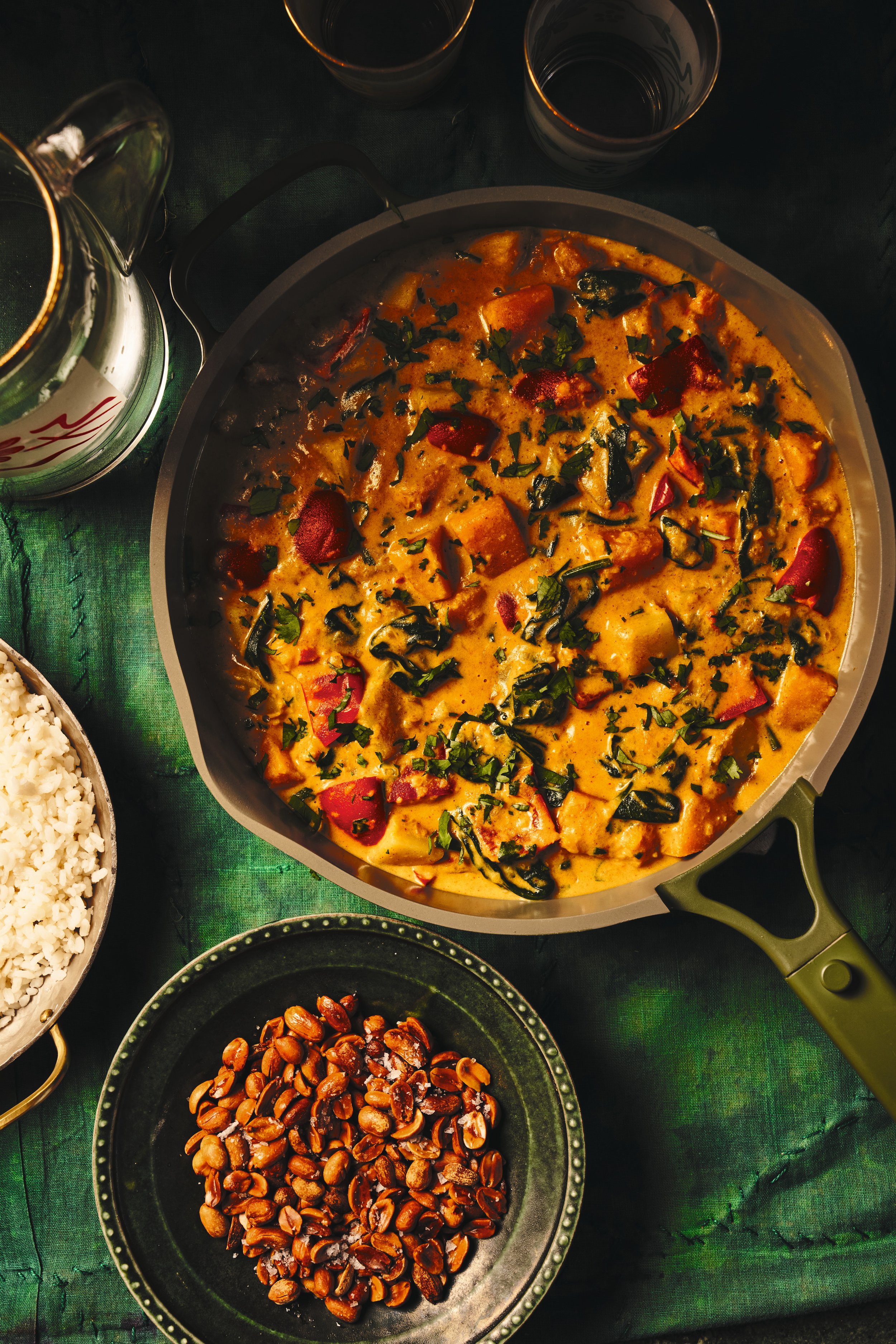Vegetable Peanut Curry with Sticky Rice
“Since discovering that my family ancestry links to Thailand, it is the cuisine that sits right beside my Bangladeshi cooking. I am always learning and experimenting with Thai recipes. Of all the curries, this vibrant peanut vegetable curry is one of my favourites to make and share with my family, especially during Ramadhan.”- Nadiya Hussain
Serves 6
Ingredients
For the sticky rice
600g Thai sticky rice (found in most supermarkets)
For the paste
1 onion, roughly chopped
1 lemongrass stalk, roughly chopped
3 Thai red chillies
6 cloves of garlic
5cm piece of peeled ginger, roughly chopped
2 tablespoons fish sauce
1 lime, juice only
2 tablespoons chilli powder
1 teaspoon palm or brown sugar
1 teaspoon ground cumin
1 teaspoon ground coriander
2 teaspoons shrimp paste
For the vegetables
oil, for frying
2 tablespoons smooth peanut butter
1 whole squash, peeled and chopped into chunks (700g)
4 medium potatoes, peeled and chopped into chunks
2 red peppers, chopped into chunks
2 x 400ml tins of coconut milk
400ml cold water
100g spinach, roughly chopped
To serve
200ml oil
150g peanuts
handful of fresh coriander, finely chopped
salt
Method
Before we do anything, let’s start by sorting out the sticky rice. By the time that is cooked, we will have this curry made.
For the sticky rice, you need to make sure you wash it really well till the water runs clear. You can use the hot tap water to remove the starch. When it runs clear, drain the rice in a colander that has very small holes so the rice grains don’t escape.
Leave the rice to drain, then pop a pan on the hob that is big enough to suspend the colander at its rim. Pour some hot water into the base, bring the water to the boil and leave to simmer.
Put the colander in the pan, making sure the water doesn’t touch the rice grains. Pop on a lid that fits the top of the colander and leave the whole thing to steam for 1 hour 30 minutes.
Occasionally check that there is still hot water simmering in the base. If it is lacking, just top it up with water from the kettle.
Now let’s make the paste by putting the onion, lemongrass, red chillies, garlic, ginger, fish sauce, lime juice, chilli powder, palm or brown sugar, ground cumin, coriander and shrimp paste in a food processor. Blend the whole thing till you have a smooth, even mixture. If you find it isn’t shifting at all, add a small splash of water. Once that is done, set it aside.
On to the vegetables. Pour some oil into a frying pan and get the oil lovely and hot. Add the paste into the pan and cook for 5 minutes till it looks dry and is much darker in colour. Now add the smooth peanut butter and mix through.
Lower the heat, get the squash, potato and red pepper in and give everything a good mix. Pour in the coconut milk and cold water and bring the mixture to the boil. As soon as it comes up to the boil, leave to simmer over a medium heat with the lid off for 30 minutes.
As soon as the potatoes are tender, add the spinach in and mix through so it can wilt for 5 minutes.
To make the peanuts, pour the oil into a pan and get the oil hot. Add the peanuts and fry till golden brown. Drain on to a plate with kitchen paper and sprinkle over some salt. Be sure to use your leftover home-made peanut oil for other recipes when it has cooled down.
Now it’s time to serve. Take your sticky rice and serve some curry alongside, sprinkling over the salted fried peanuts and chopped coriander.
Credit: Recipe from Rooza (Penguin Michael Joseph) by Nadiya Hussain, out 23 January, available to pre-order buy from Amazon. Rooza is Nadiya Hussain’s heartfelt culinary tribute to Ramadhan. This book invites you on a joyous and explorative journey through Muslim cuisine. It illuminates the rich rituals, traditions, and the incredible diversity of dishes from across the Islamic world.
Photo by Chris Terry

